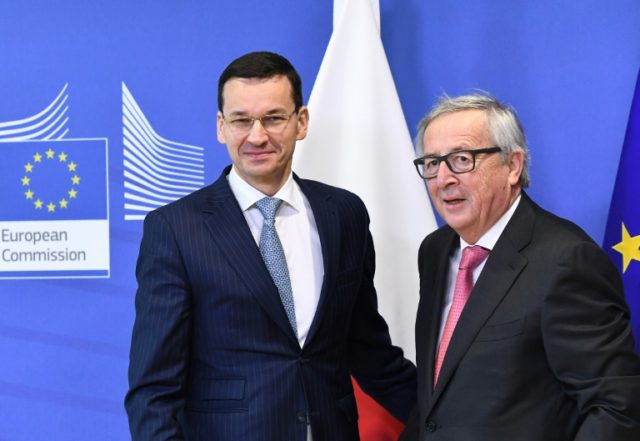Brussels (AFP) – Polish Prime Minister Mateusz Morawiecki on Thursday handed Brussels a detailed defence of Warsaw’s controversial judicial reforms and warned that any EU disciplinary action could deepen a “populist” backlash.
The EU in December launched unprecedented legal action against Warsaw’s rightwing government over “systemic threats” to the independence of the Polish judiciary, and gave it three months to comply.
With a deadline of March 20 looming, Morawiecki gave the Polish government’s 96-page “white paper” to European Commission chief Jean-Claude Juncker as part of a dialogue to end a two-year row.
“We expect a deep and serious analysis of this document,” Morawiecki told a press conference afterwards in Brussels.
Warsaw could be stripped of its voting rights in the 28-nation bloc under the Article 7 procedure of the EU treaty — covering systemic threats to the rule of law — which had never been previously used against an EU state.
An official summary of the Polish document said the EU had no justification for the Article 7 procedure because Polish judges “enjoy very strong guarantees” of independence, and because the reforms resemble regulations in other EU democracies.
The Polish paper warned sanctions could create a “dangerous precedent” for undermining the sovereignty of EU member states.
It could also lead to “a possible strengthening of anti-European sentiment that has been more and more apparent,” it added.
“It can further lead to growth of populist political forces seeking to dismantle one of the biggest successes in post-war Europe that is the European Union,” it said.
Poland’s ally Hungary, which has also clashed with Brussels over democracy issues, has vowed to veto any sanction.
– ‘Purge the rottenness’ –
Morawiecki — whose efforts to improve Poland’s image since his appointment in December have been marred by a row over a Holocaust law — blamed the reforms dispute in part on a communications failure on both sides.
“Two monologues don’t equal one dialogue,” the self-professed pro-European premier told the German Marshall Fund think tank later.
He added the reforms were aimed at rooting out judges from Poland’s communist era but the goal was hard to understand for Europeans who did not share the experience.
“Given this past we have to purge the rottenness out of this system,” Morawiecki said.
Calling his talks with Juncker “quite promising,” he said he hoped he would be able to convince the EU that the reforms guarantee judicial independence.
“I think we will be able to find a way out of this trap,” he added.
Juncker’s spokesman Margaritis Schinas said the commission “will assess it (the white paper) carefully” while declining to comment on the atmospherics of the talks.
Poland began overhauling the judiciary after the rightwing Law and Justice Party (PiS) came to power in late 2015 in what observers called a populist wave.
The summary document argued that the reforms guaranteed as much independence as judicial procedures in Spain, Germany, Denmark, the Netherlands, France, and Britain.
On top of earlier court reforms, Poland’s rightwing dominated parliament in December adopted reforms allowing it to choose members of a body designed to protect judicial independence and reinforce political control over the Supreme Court.
The EU has also frequently taken Poland to task for violating the bloc’s environmental standards and for failing to comply with a Brussels decision to relocate asylum seekers from Italy and Greece.

COMMENTS
Please let us know if you're having issues with commenting.